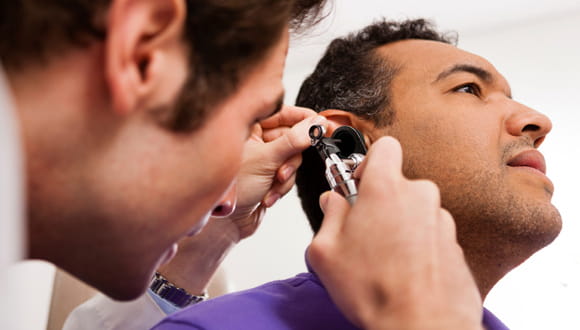When Should I Worry About Ringing in My Ears?
Jan. 18, 2022 - Katie McCallum"Why do I hear ringing in my ears?"
It's a concerning question to ask yourself.
If you hear ringing in your ears more often than not, you know just how bothersome or distracting this noise can be. And that it's distinctly different from those random, phantom sounds you might have heard on rare occasions after standing up too fast or while dealing with a headache.
"Hearing continuous sound in one or both of your ears is called tinnitus," says Dr. Jeffrey Vrabec, an ENT doctor specializing in neurotology at Houston Methodist. "It's most often described as a ringing, but people can hear tinnitus differently."
The common descriptions of what tinnitus sounds like include:
- Low- or high-pitched tone
- Static or buzzing
- Humming
- Cricket-like sounds
"Tinnitus can vary over time, sometimes becoming fairly disruptive and even debilitating," says Dr. Vrabec. "If it's the most important thing you think about and it's keeping you from carrying out or enjoying daily activities, it's certainly time to do something about it."
What causes ringing in your ears?
"Hearing a continuous ringing in your ears is almost always a side effect of hearing loss, typically an early indication of it," says Dr. Vrabec. "Hearing loss happens in your ears, but the resulting ringing you may hear as a result does not. It's happening in your brain."
Your brain plays an integral role in hearing — making sense of the sounds around you by processing the information received from your ears. It helps you focus on the most relevant sounds you're hearing, distinguishing these from background sounds and filtering out unwanted noise.
As you can imagine, this is a busy job for your brain.
Hearing loss reduces the amount of sound your brain has to interpret, giving it less to do. Tinnitus is one unwanted consequence.
"When your auditory cortex — the part of your brain responsible for hearing — is bored, it starts looking for something to do, some sound to interpret," explains Dr. Vrabec. "Tinnitus occurs as a consequence of that, and it's essentially the result of your brain reacting to hearing loss. Since the input to your brain has changed, your brain begins to misinterpret what's actually there, resulting in the perception of other sounds, namely ringing."
This is why people often hear the ringing in both ears and sometimes can't pinpoint where exactly the sound is coming from.
How do you stop the ringing in your ears?
The first step to treating tinnitus is to get your hearing checked by an audiologist.
"If you are hearing continuous sound in your ears, it is very likely some measurable hearing loss is present," says Dr. Vrabec. "A hearing test will uncover how severe the hearing loss is or whether your tinnitus may be the result of something else."
If you have hearing loss and worsening tinnitus, the good news is that you don't have to live with a never-ending soundtrack of unwanted noise.
"When treating tinnitus, the goal is to activate and condition your auditory cortex — reinforcing it to listen to real sounds and training it to not think about the unwanted noise it's perceiving," says Dr. Vrabec. "So we're not actually removing the tinnitus, we're just eliminating your brain's attention to it. This is accomplished by listening to masking sounds, some comforting sounds you can play in the background, such as rain, a stream or waterfall, the beach."
"These types of sounds are quite valuable at inhibiting the perception of tinnitus," says Dr. Vrabec. "They keep your brain busy, making it less likely to fixate on the ringing."
Most people find success in using masking sounds to reduce their tinnitus, but this isn't always the case.
"If your symptoms continue to progress or worsen, let your doctor know," says Dr. Vrabec. "There are medications that can be considered."
It's also important to consult a doctor about your symptoms since, in rare cases, tinnitus can be a side effect of something other than hearing loss, which can change how your doctor approaches your care.








